The post China Won’t Cut Ties with Russia Just to Appease Europe first appeared on China Academy.
]]>The post China Won’t Cut Ties with Russia Just to Appease Europe first appeared on China Academy.
]]>The post Liberal Elites Were Blind to the Rise of China and the Decay of the West first appeared on China Academy.
]]>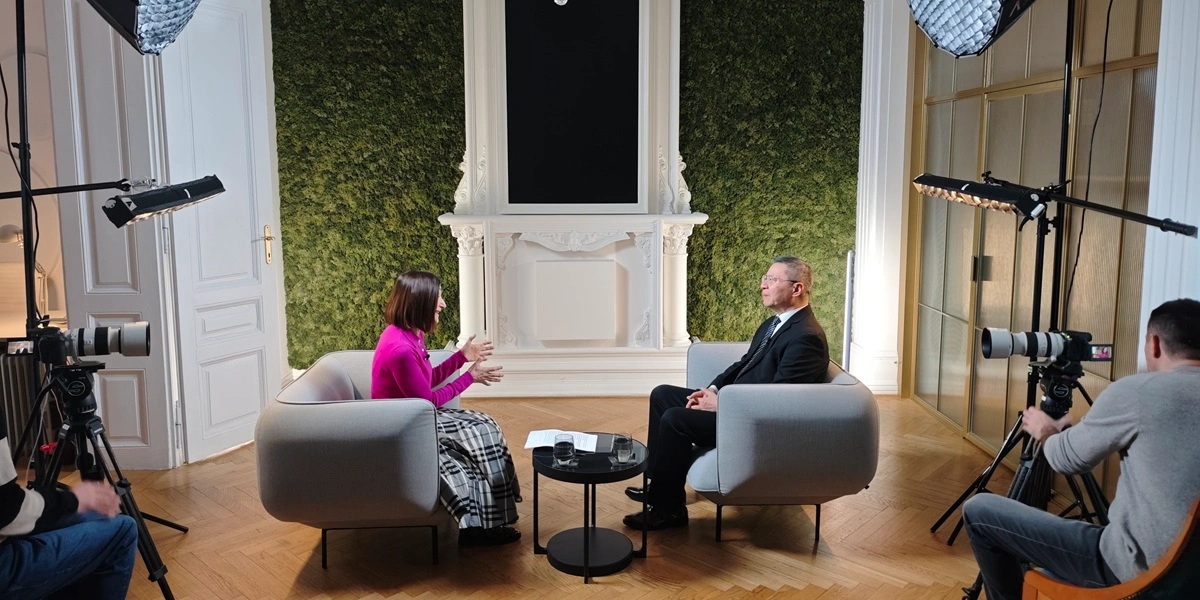 Professor Zhang interviewed by RT Balkan’s Ljiljana Smajlovic
Professor Zhang interviewed by RT Balkan’s Ljiljana Smajlovic
Ljiljana Smajlović:
I am exceptionally pleased to announce that today I am speaking to professor Zhang Weiwei. He is a leading theorist of the China Model of Development, which holds that China is on its way to success, and whose predictions have, to a large extent come true. You teach politics at Fudan University. You are the dean of the China Institute, which is a premier think tank in China. I hear that during your time in Belgrade, you visited with our foreign minister, and observed student demonstrations in front outside government offices. What was your first thought? I’m asking you this because I don’t know if it’s an overstatement to say that yourself are sort of the result of the Chinese cultural revolution, a product of it. As a teenager, you spend 3 years during the cultural revolution in the shanghai factory, carving jade. Now how exactly did that lead to your serving as Deng Xiaoping’s interpreter in your 20s?
Zhang Weiwei:
We went through the cultural revolution, of course that I was very young. Chairman Mao was not happy with China’s educational system, especially university system. He thought it was too bourgeois and so he said perhaps we should abandoned this college entrance examination system. We should allow the high school graduates directly go to work, as a worker, soldier or farmer. And then you have to go there working for 3 years before there is opportunity to be selected to enter universities. So I went to work as a worker, very junior. And then amazingly, exactly 3 years later, Cultural Revolution was over, and Deng Xiaoping came to power. He said we should reinstall this college entrance examination system. So I began to apply for university education and passing through exam. I succeeded. Before that, learning English was my hobby, but it’s a good hobby and strong hobby. And I spent a lot of time spare time.
Ljiljana Smajlović:
It served you well.
Zhang Weiwei:
Yes, it served me well. And so I went to the department of English and American literature. That’s how I became an interpreter for Deng Xiaoping.
Ljiljana Smajlović:
You have long battled the ideological prejudices of your western colleagues, academic peers. And you were an early advocate of the notion that China would one day overtake the economy of the United States. And now that sounds like an understatement.
Zhang Weiwei:
In many ways, it’s true. But the Chinese government is very cautious about this. Some people say it’s a top secret for the United States. They don’t want to be number two. Also, if you look all the data, statistics, in fact, China begin to be the largest economy in terms of purchasing power parity by the year 2014. Already 11 years have elapsed since China became the world’s largest economy by PPP. So, I think as an academic, as a scholar, we should really stick to the truth and to see the world as it is. I’ve also noted, I often quote the line from Vladimir Putin, these days for quite a few years, Russia only talk about purchasing power parity. Russia is the largest economy in Europe full stop.
Ljiljana Smajlović:
But this is not the only thing you predicted correctly. I am told that in January 2021, just as Biden was inaugurated, you predicted that he would be a transitional figure and that trump would live in the white house again. And you also said, I talked to my party colleagues and they agreed, and we have been preparing for this for 4 years, and we are ready for him.
Zhang Weiwei:
That’s true.
Ljiljana Smajlović:
Now, were you looking forward to his coming back into the white house? Or were you resigned to it in advance?
Zhang Weiwei:
In many ways, this is the choice of the American people. For us, you have to compare Biden and Trump. Personally, and perhaps my many Chinese colleagues, and among the general public also share this view: Biden was viewed more and more, even by today’s standards, too hypocritical and double standard. And trump, at least, he is a straight talker. So you can understand him and his message very clearly. I remember, chairman Mao once said that we like to deal with the right in America, because somehow, they were a bit more honest. For the general public, Trump provides a lot of fun. So China look at the United States very differently, because we are thinking of there is a competition. We’re not afraid of that.
Ljiljana Smajlović:
Well, you’re not afraid of that, it’s also an understatement. So tell me about this first round of the trade war. How did that go in your view, the tariff?
Zhang Weiwei:
China Institute is one of the few leading think tanks in China predicted in the year 2018, when the trade war broke out, we made very accurate forecast. We said today, the U.S. economy depends more on China than vice versa. So both sides will suffer from a trade war. No doubt about this, but U.S. will suffer more. The U.S. will lose miserably, same goes with tech war.
Ljiljana Smajlović:
Tell me about this great evacuation of TikTok users to your Little Red Book, the Chinese alternative. It’s a funny little paradox, but does it also change things if so many young people in America suddenly compare notes with their peers in China.
Zhang Weiwei:
It’s eye-opening for both sides, because it’s the Generation Z talking to Generation Z through internet. And for the first time at such a scale, which means literally millions upon millions talking to each other. With AI translation, what anyway they can communicate easily with each other as he compared notes. And all kinds of comparisons in the end, priority was given to living standards. What’s your salary? How much you spend on hospital? How much you spend on tuition? And what kind of price for fast food? In the end, Chinese did not realize, actually the real living standards for the ordinary Americans were not that high. The Americans did not realize the Chinese living standards were so high, so much affordable, everything. Tuition is almost free for university education, many Americans with these debts for decades to come, (paying back) university loans in tears, and also compare the canteens in universities, high schools, kindergartens. The Chinese ones are so much better and compare these cities, Shanghai, New York. Shanghai is so much better than New York. It’s almost a kind of gap, so evident, because with the clips of videos, with all kinds of. This exchange is very, very good.
Ljiljana Smajlović:
And we saw the DeepSeek, but who is going to win the trade war if it really erupts.
Zhang Weiwei:
Now, for trade war depends on United States, because I think especially at this particular moment, it seemed Donald Trump started offensive against all.
Ljiljana Smajlović:
True, against his allies as well.
Zhang Weiwei:
That’s true. It reminds me of Henry Kissinger’s remark. Allegedly, he said, it’s risky to be enemy of the United States, it’s fatal to be the ally of the United States. He started with more forcefully with Canada, with Denmark, with EU. Basically, I think this is part of his bluff, and then he will have a deal with his allies and try to do the deal with China, whatever. But who knows the end result? I think U.S. will suffer more inflation. I gave a short interview to New York Times, just a few days ago about trade war. I said the same thing. I said we made a rough calculation over 90 % of the increased tariff were actually paid by American consumers and companies the first round.
Ljiljana Smajlović:
I read that article, does it offend you that the New York Times has referred to you as a propagandistic academic?
Zhang Weiwei:
They prefer stupidly labeling others. The secret of China’s success is what we call seeking truth from facts. We seldom label others. If you have certain valid points, we have good discussion with you. So I think as Chinese scholars, we are more sophisticated than New York Times.
Ljiljana Smajlović:
I read remarks you made about a phenomenon you called spiritual Americans. And you said we have to take that out of our discourse, and you argue for a Chinese discourse. Now, we have a similar phenomenon. We don’t call it spiritual Americanism, but I think I know what you’re talking about, but what does it? What is a spiritual American? What is a Chinese spiritual American?
Zhang Weiwei:
It is amazing. I have quite a few friends, American scholars, and they came to China from time to time, especially before COVID. And some of them told me, even we Americans believe that our country has gone wrong, the American dream is over. It seems apparently the American dream was still shining with quite a group of Chinese intellectuals. That’s this type of people somehow just can’t believe so many things went wrong in the United States. When Donald Trump said each and every time in his major statements, America is a failing nation, these Chinese intellectuals did not believe. Literally, they said, don’t tell us this, this is our homeland, our dream, our spirit, everything goes there. It’s not that many, yet for all kinds of reasons, they prefer to stick to their views. They still have some influence in the public sphere, in the media. Yet their influence declined drastically.
Ljiljana Smajlović:
Are they also proponents, advocates of the paradigm, the democracy versus authoritarianism paradigm.
Zhang Weiwei:
Basically, they don’t have their own independent thinking. They just copy neoliberalism. So when Biden lost his power and Fukuyama lost his influence, so goes with neoliberalism and similar end-of-history thesis. Yet they were still dreaming, that would be something true. So though it’s already outdated.
Ljiljana Smajlović:
You had a famous debate with Fukuyama many years ago. And you were right to say that Fukuyama’s end of history never came about, but he also, I would say, almost made a fool of himself by arguing a couple of days before the election. Not only that Biden would win, but that he had a bottle of Venezuelan rum ready to celebrate the Kamala Harris, not Biden, that Kamala Harris would win. And that, I think, was a reference to regime change in Venezuela that would be coming. And now we saw the Americans make immediate contact with Venezuela. It doesn’t look like the regime change is coming or is at the top of the agenda. What does that mean to you?
Zhang Weiwei:
No, I give an interview not long ago in China. I was asked whether Fukuyama has changed his view, especial about the end of history. I said, judging from his written pieces, things he said he about COVID, Ukrainian crisis, and more, I said, no, he still sticks to his own thesis end of history. But he tried to explain this more subtly. Now, that’s his tragedy in many ways, because he was somehow constrained immensely by this kind of limitation and his own creation. As I said, Chinese philosophy is seeking truth from facts. You have to look at the facts and with vigor rigorously examine these facts. That’s why he often makes ‘romantic’, if I may use this word, out of touch with reality. The kind of predictions, as you mentioned example, just now.
Ljiljana Smajlović:
But people like Fukuyama have just won Nobel prizes arguing that eventually everyone has to become the Western type liberal democracy. It’s the only way to be successful, and to make friends and frighten your enemies. A lot of people ridiculed that Nobel prize, I’m referring to the famous book by a Turkish economist, who is now in the United States.
Zhang Weiwei:
I told Fukuyama, in the year 2011, I said the western liberal democracy, as it is today, is very much a short term transitional phenomenon in the long human history, as a Chinese, as a citizen of a civilizational state. I’ve seen so much ups and downs in China’s own history. We know it’s not the end of history, history is evolving unfolding before our eyes. We are witnessing changes, as Xi Jinping said, unprecedented in hundreds of years of history. Actually, this Western model will go, will decline inevitably because it has its, I call the genetic defects.
Ljiljana Smajlović:
What do you mean by genetic defects of this system?
Zhang Weiwei:
For instance, I told Fukuyama this problem of blind belief in rational human being. Human beings are not rational, especially with the involvement of money, the new social media, today, AI. So being rational or keeping being rational becomes more and more of an uphill task. This is one change. And also especially in the West, this absolute right versus. Because in the Chinese culture, rights and responsibilities must go hand in hand. If you only talk about rights, then the society, a modern society cannot function. All these are, I also told him that Western democracy, American democracy will end up in very simple-minded stupid populism.
Ljiljana Smajlović:
Not just populism, but you have a theory of why the Western leaders are weaker and weaker. Please explain in your words.
Zhang Weiwei:
Because this so called one person, one vote essentially became a show business rather than about performance, real performance, solid performance. It’s how you act, how you use PR, how you recruit those experts, media experts to present a good image rather than about the substance. And then it’s about short-termism rather than long-termism. So this is all the problem of the Western political system. I told the EU guy in Paris not long ago; I say you look at this Green Deal. It’s so much fanfare in EU and the stuff there goes there. I said China already completed Green Deal, done. But you’re still talking about this. I said you have to study Chinese model very carefully how we do it. For EV vehicles. It’s the result of four Five-Year Plans, 20 years. So we became the leader in the EV in the world. Can the Western model do that? You talk about green revolution? Is it possible? Very difficult.
Ljiljana Smajlović:
You would say that Donald Trump is not an aberration as the liberal thinkers in America are telling us it’s just an accident of history. You conceive of him as the logical outcome of process of democracy. This is where it was leading all along for the last decade.
Zhang Weiwei:
Basically, what we did was we tried to understand the United States as it is. So we look at the data, look at the statistics, we found a lot of falsehood. So we began to decipher U.S. GDP, we find a lot of loopholes. In the end, we find that, in fact, Donald trump’s statement, America’s failing nation was more accurate. And then you look at these so many opinion surveys revealing that about 70% Americans were not happy with the American economy. Despite the fact that Joe Biden was talking about how the economy was good, and job creation was good, we know these were lies.
Ljiljana Smajlović:
So Donald Trump is not a fan of the democracy versus authoritarianism paradigm. I see now a lot of people are talking about a seismic shift. People are saying that Trump’s moves are not as much as just causing Trump Chaos. In fact, I’ll quote, an American attempt to strategically unwind their hegemony on their own terms, before they have to do it Kabul or Saigon style, where they’ll have to flee from the rooftop of the American embassy and get on helicopters.
Zhang Weiwei:
I think there is a point in this statement, in the sense that if you look at the overall strategy of Donald Trump, if there is one, it’s about withdrawing from different parts of the world and going back to Americas. So it’s more like a new type of Monroe Doctrine. So he was trying to consolidate the United States at home, and then in its neighborhood from Mexico, Panama canal to Canada, and Greenland. This is somehow a kind of outline of his new strategies in geopolitical terms, far less concerned with Ukrainian crisis, China, Taiwan, this type of thing. So in a way being US neighbors, now, in Latin America, that became more serious problem.
Ljiljana Smajlović:
The United States saying our empire may be over, but we are going to stop its decline by holding on to what matters to us, which means that there’s some poetic justice in that, which means that vassal states will not do any better than others. The America’s best friends in Europe were probably the Danes who followed every precept and every advice. And would have jumped off the cliff if they’ve been told to. And now it seems that’s not being rewarded, being a vassal state. Is this America dropping its pretenses? Because we heard the American foreign minister, the Secretary of State, saying this international order isn’t working in our favor. It’s being used against us. He seems, even before the Americans, even when they said sovereignty matters, territorial integrity matters to us, we hold it sacred. They didn’t act that way. But now it looks like Trump is ready to even drop the pretense of caring about this, and his Secretary of State, who is part of the bulb, he was part of the foreign policy elite, the establishment. He’s now talking very differently than the establishment. Is this a serious thing? Is this something you’re studying?
Zhang Weiwei:
I think in the first place on the part of China, we understand what has happened, Trump has become more unpredictable. Yet we call it with Chinese certainty without the American uncertainty. So that’s fine with us. I was a bit amazed along with your thesis there. I remember when Donald Trump gave this video, talk to Davos, and he had Q&A and a one question was raised, could we European work together with United States and to tackle the China problem. He said, Europe is worse than China. I share this view.
Ljiljana Smajlović:
You’re laughing happily. Is it because you think it’ll help the EU understand that it might rather than alienating China, stop counting on Trump’s help and maybe look out for itself.
Zhang Weiwei:
No, the point is, I did my PhD in Geneva, and I spent 20 years in Europe before I left Europe back to China about 15 years back. I had the impression that Europeans were being too culturally sophisticated and too proud to be a vassal to the United States, especially at the level of the intellectuals. Over the past few years. It seems this kind of European spirit has gone. You no longer have, can’t imagine individual leaders like de Gaulle, or even like Chirac, who can say no to the United States. I was in Geneva again, last October, we discussed security matters in a Geneva think tank. I said, in fact, outside Europe, everyone knows or everyone agrees with what French president Macron said, Europe increasingly becoming a vassal to the United States. How European and EU leaders did not realize that? From my point of view, my humble Chinese, very blunt and candid advice is, Europe has to fix its America problem. Otherwise, you have no way to become whatever pole in the multi polarity, or defend your own interest. So many problems are created by the United States, by NATO. I quote a famous saying, you know it very well, the role of the NATO is to keep America in, keep Russia out and keep Germany down. You don’t do that as a big power. Look at China, how we do in Asia, China and ASEAN ten members together with the population 3 times of European population. Yet, China as a big power, we respect ASEAN neutrality, sensuality, don’t pick sides, nuclear free zone, and we promote trade vigorously between China and ASEAN. We have set up the world’s largest free trade zone. That’s a good example of how a big power should do vis-a-vis regional small countries, regional arrangements and regional organizations. This is a good example for EU to at least study if you don’t want to follow.
Ljiljana Smajlović:
Speaking of small countries, is Vuk Jeremićright when he says, okay, if there is a trade war between China and America, emotionally we’ll be on your side, but economically we may end up dead.
Zhang Weiwei:
It depends on how you look at this particular country’s relations with China. For instance, if we would look at the figures of global trade, China now is the world’s largest trading nation, and China is also the largest trading partner for over 140 countries. Most of them are small countries. So I told the Sciences Po the other day before I came to Serbia, I said if Donald Trump decided to withdraw from globalization, so be it, we are the largest trading partner for over 140 countries. We can continue with globalization new style, based on the Chinese idea of discussing together, building together, benefiting together, and BRI.
Ljiljana Smajlović:
Two questions on this. You are aware that when Western leaders come here, they tell us you need to sit only on one chair. You cannot try to sit on the Russian chair, the Chinese chair, the European chair, you have to choose one Western liberal democracy chair. And then they say, because Russian influence is malign, Chinese influence is malign, only we are benign, and only we wish you well. Now that pretty clearly is not true, but how do you respond to this benign-malign paradigm?
Zhang Weiwei:
I said, take China-Serbia relations as an example, this relationship goes way beyond the current status of relations, because China, Yugoslavia developed very good relations. I myself came to Yugoslavia in 1986. We discussed with Yugoslavian leaders about how to promote trade, technological cooperation.
Ljiljana Smajlović:
That’s 86?
Zhang Weiwei:
1986, almost four decades ago. So these are two separate matters. This EU-Serbia relation that’s one, and China-Serbia relation is another one, same with Serbia-Russia relations. They have their own logic, which no other country should try to influence. This is the right approach. Furthermore, given my knowledge of the EU, I think the more Serbia develop good relations with Russia, with China and with other countries, EU will think more about, we should try our best to develop good ties with Serbia. That’s my logic.
Ljiljana Smajlović:
That’s clearly also what the government here is doing. But let me ask you, in 1986 what did you think of Yugoslavia? Was it developed? Did it look good? And did it look old or did it look like a disintegrating country or a country that was going to disintegrate in 4 years?
Zhang Weiwei:
In Retrospect Yugoslavia was in very serious crisis. It was over-decentralized. And price was out of control. Yet, as we all know, Yugoslavia was by then a relatively more developed economy in the socialist bloc. Indeed, when I came here, we flew from Romania, from Bucharest to Belgrade. We were deeply impressed.
Ljiljana Smajlović:
Deeply impressed vis a vis Romania, or deeply impressed vis a vis China?
Zhang Weiwei:
Both. Romania and China.
Ljiljana Smajlović:
Only 86?
Zhang Weiwei:
1986 for the first time I myself saw this kind of five-star hotels, supermarkets.
Ljiljana Smajlović:
There were none at that time in China.
Zhang Weiwei:
No. At that time Belgrade was more developed than Beijing. We also went to the largest department store to see their economic reform at the grassroots. It’s called the shareholding system. So shop assistants can own certain share of that particular department store. These were all eye-opening for us, but we also realized their kind of economic political reform have gone a bit too far. As a result, the economy was almost out of control. At the same time, they did not allow the real so called very concept of market economy to play. But on the whole at the personal level, we were impressed with its already level of development. But theoretically, we know it’s also in trouble.
Ljiljana Smajlović:
So you say in 86, it was an eye-opener because you could also see what was going. But do you realize how depressing this sounds to me to hear you say this? Tell me about the perception of Serbia in China. How relevant is the bombing of the Chinese Embassy in Belgrade in 1999 to today’s population of China? How many people even know about it?
Zhang Weiwei:
Indeed, Chinese have a long memory.
Ljiljana Smajlović:
But the strategic patience, too.
Zhang Weiwei:
As well. People not only my generation, even the young generation. They have either seen many Yugoslavian movies, or they can sing Yugoslavian songs. Especially Walter Defends Sarajevo is very popular in China at that time.You can still hear its music in China. So this kind of soft power from the time of Yugoslavia still had influence among the Chinese young generation. The Chinese Generation Z is very strongly in favor of socialism. This is something very unique. They like everything about Soviet Union, Yugoslavia. If you look at the Bilibili, the largest app for young people and have all kinds of discussions of Yugoslavia, Soviet Union, about leaders of Tito, Lenin, Stalin and more. I think today why China-Serbia relations are so solid. For one thing, it has a very strong and popular support among the Chinese public. It’s also among the people here.
Ljiljana Smajlović:
So it is still relevant and it still resonates with Generation Z? The bombing, not just Walter Defends Sarajevo.
Zhang Weiwei:
For the bombing itself, for sure. That was a kind of a wake-up call. For many years on the China’s economic reform in the 1980s, 1990s, Chinese leaders and government said we should focus more on economic development rather than defense spending. So we gave top priority to improving people’s living standards and improving the economy performance. But this particular bombing was a wake-up call. That was the time of Jiang Zemin as Chinese General Secretary of the Party. He began to talk about we should have powerful military. So we began to invest heavily in defense, in scientific research for new type of defensive systems. So now this policy is paying off. So it’s again a result of over 20 years of continuous, serious effort committed with long-term planning and longtermism. You may know that in December last year, China tested its first hypersonic 6th generation jets, which United States did not have.
Ljiljana Smajlović:
Was it a terrible national humiliation to hear of that bombing?
Zhang Weiwei:
Of course it’s a humiliation. And people remember that. Of course the US leaders at that time, including Bill Clinton, made a formal apology or whatever. Still people think this is a serious humiliation for China. That will never happen again.
Ljiljana Smajlović:
It seemed a very insincere apology because they said we apologize, we didn’t mean to, on the other hand, the journalists who were killed were really spies.
Zhang Weiwei:
Indeed, we look at this as a whole part of the sad story. We think as with the West in general, this kind of, you may call arrogance or stupidity, is always there. So we treat them as it is. If you look at the latest China retaliation against Donald Trump’s tariff. It’s severe.
Ljiljana Smajlović:
Tell me about that retaliation.
Zhang Weiwei:
Basically, Donald Trump said let’s have a 10% increase of tariff, and China said let’s have 10 to 15% increase our tariff against US goods. And it’s coming.
Ljiljana Smajlović:
What is coming? Your tariffs?
Zhang Weiwei:
If you look at the latest announcement, not only tariffs, but also very strict banning of rare metal exporting to the United States. This kind of control, this kind of banning, this kind of counter-sanctions, take effective. They are affecting American military equipment, defense industry, in each and every field of United States, because they are the raw material for new weapons.
Ljiljana Smajlović:
For years, you used to say the liberal democracy is not the only model. Some countries may use better other models just as well and have better governance. But now you’re saying something else. Now you’re saying we’re superior. Look at the LA fires, look at the way we handled our earthquake. Tell me about that.
Zhang Weiwei:
Essentially, a country is successful or not, has to do with to what extent it find its way to success. I describe Chinese model as good model appropriate for the Chinese national conditions. For instance, why China’s economy is doing better and China’s scientific research is doing better than many other countries, than the West? One important reason is we are, in official terms, a socialist market economy, or I call a mixed economy. If you look at the the use of the Internet app in China, it’s so much more extensive than any other countries. With one smartphone, you can do everything. And you do not use any cash for a decade already. Life becomes so convenient. If you want to have a dinner for friends of six, you just use your app, then in 30 minutes everything arrives your home. It’s amazing. Behind this is the state sector responsible for first rate infrastructure, including highways, bullet trains, and digital services. That’s covered by the state sector. And the private sector provides first rate services to the consumers. So this good combination pays off. I was in Paris the other day. I said, to be honest, if you look at the Internet service, China’s Xinjiang, and Tibet offer better service than Paris center downtown. It’s 5G everywhere. So long as there’s a village, there are human beings, we provide 4G and 5G services. Make sure it’s the state paying for that. Then, as Xi Jinping’s economic theory goes, supply itself creates demand. When supply is available there, then Tiktok and many other things come out. The Little Red Book.
Ljiljana Smajlović:
But I still want you to compare the way the richest area in the United States, Silicon Valley, LA, what the state response was to that catastrophe, and the earthquake in Tibet.
Zhang Weiwei:
That’s true. This kind of occurring of two disasters simultaneously, one is the forest fire in Los Angeles, in what I call the developed of the most developed region of the United States. And one earthquake that occurred in mountains areas over 4,000 meters high above sea level, Tibet part of China in this part of the world. Yet tens of thousands of houses and villas were destroyed by this fire. For Chinese, it’s ridiculous, how can your preparedness was so low and response is unbelievably pathetic by Chinese standards, way below the minimum level of the Chinese, whatever, rescue service. If you look at Tibet, the Chinese reaction, within 10 minutes, drones, helicopters began to offer supplies to the disaster region. And within 24 hours, everything is restored, electricity, power, water…
Ljiljana Smajlović:
Now compare yourself to Russia, or at least your conversations with your academic colleagues and think tank people. What’s the difference?
Zhang Weiwei:
I was invited to Russia three times last year. We went to attend various conferences, including economic forums in Saint Petersburg. And we listened to the amazing statement by Vladimir Putin, which we like. I think it’s very good that China and Russia have developed this comprehensive strategic partnership, and economic ties are booming, trade ties are booming. These are very, very good and also more and more humanistic cultural exchanges between the two sides, and a lot of tourists from both sides into each other’s countries. Positive, very good.
Ljiljana Smajlović:
Now, you are sensational with predictions. Do you have a prediction for when the Ukraine war will end?
Zhang Weiwei:
No. Let me say this way, because Donald Trump said, he could end this war within 24 hours.
Ljiljana Smajlović:
Now, in a hundred days.
Zhang Weiwei:
This is difficult. Because a lot of vested interest involved. So many contracts signed between US military industrial complex. So I think it will take more time. But I also share this view that Donald Trump was, at least vis-a-vis Ukrainian war, he was far less pro-war. So this is a positive sign. And also, I think maybe China and Russia share this view as well. The US problem has to do with deep state. Donald Trump seemed to be increasingly more and more serious about handling the deep state, which is fine, at least for Chinese.
Ljiljana Smajlović:
What do you think about the dismantling of USAID?
Zhang Weiwei:
Congratulations.
Ljiljana Smajlović:
Congratulations to us?
Zhang Weiwei:
To whoever disliked the deep state.
Ljiljana Smajlović:
You think it’s going to be good for every country.
Zhang Weiwei:
Indeed, you look at it. Problems with the deep state, so many wars, color revolutions, so much destruction, loss of millions of lives due to this deep state. So then at the same time, it has caused so many problems for the United States. If you look at the downtown, even in Manhattan, the infrastructure is so out of date. I said Shanghai is way ahead, 20 years ahead of New York. So you must focus more on domestic development. So I share the comment made by Donald Trump, he said that America is a developing country. I don’t object to that view.
Ljiljana Smajlović:
It was music to my ears when you said in your Belgrade lecture that there was some dissent over Gorbachev, how wonderful he was, and that you felt all along that he was terrible. And then you said something interesting about Deng Xiaoping’s comment, and I’m going back to the Russia-China a parallel. You said that Deng Xiaoping had said we should never do that to Chairman Mao, what the Russians have done to Stalin? What does that mean exactly? And how does that illustrate a difference between you and Russia?
Zhang Weiwei:
That’s indeed a fascinating part of the history, because Deng Xiaoping was Party’s General Secretary in the year 1953, he was participating in the 20th National Congress of the Soviet Communist Party. He was a guest. So this famous secret report about Stalin was presented by Khrushchev. And when Deng heard this report, even not the written text, he just had oral reports from the Soviet friends. Then he said, my immediate reaction is, we should be slightly more prudent than doing things like that way. When he came back to power after the Cultural Revolution, there was a lot of grievances about prosecutions carried out during the Cultural Revolution, a strong momentum, especially among the Chinese intellectuals against Chairman Mao. So Deng Xiaoping said we should adopt a formal resolution on the Cultural Revolution. And we’ll say this is a disaster for China, but the Cultural Revolution was launched by Chairman Mao. So we have to have a correct assessment of Chairman Mao. And Deng said, we do this way, 70% correct in view of Chairman Mao’s contribution to the founding of the Communist Party, founding of the People’s Liberation Army, founding of the People’s Republic, 30% wrong. So 70-30 percent, then he said, we will never treat Chairman Mao like Khrushchev treated Joseph Stalin. And he said, given Chairman Mao’s contribution to the Chinese nation, his portrait will be forever in the Tian’anmen Rostrum.
Ljiljana Smajlović:
Just for fun, would you give me as a similar assessment of Stalin? 70%, 30% or a different weight?
Zhang Weiwei:
It depends on how you view him, but from my limited knowledge of the public opinion in Russia today, Stalin, for many years, has been among the most popular political figures in Russia today. Historical changes occur, sometimes historical figures go down, sometime go up. But now after so many ups and downs, people began to appreciate when you are laid back with the time of history, you can see things more clearly. Certain historical contributions like his role in the Second World War to decisively defeat Nazi Germany will be forever remembered by the Russian people, by the people in the world.
Ljiljana Smajlović:
Mr. Zhang, I want to thank you. It has been a privilege for me to be able to talk to you.
Zhang Weiwei:
Thank you very much. It’s very, very pleasant.
The post Liberal Elites Were Blind to the Rise of China and the Decay of the West first appeared on China Academy.
]]>The post The US and UK’s AI Declaration Snub: Reasons Unveiled first appeared on China Academy.
]]>The post The US and UK’s AI Declaration Snub: Reasons Unveiled first appeared on China Academy.
]]>The post The West Is Freefalling, But Will They Freefall Without a Fight? first appeared on China Academy.
]]>The post The West Is Freefalling, But Will They Freefall Without a Fight? first appeared on China Academy.
]]>The post Top 3 Challenges of the Chinese Economy in 2025 first appeared on China Academy.
]]>The post Top 3 Challenges of the Chinese Economy in 2025 first appeared on China Academy.
]]>The post Why Are Century-old German Automakers Failing at EVs? first appeared on China Academy.
]]>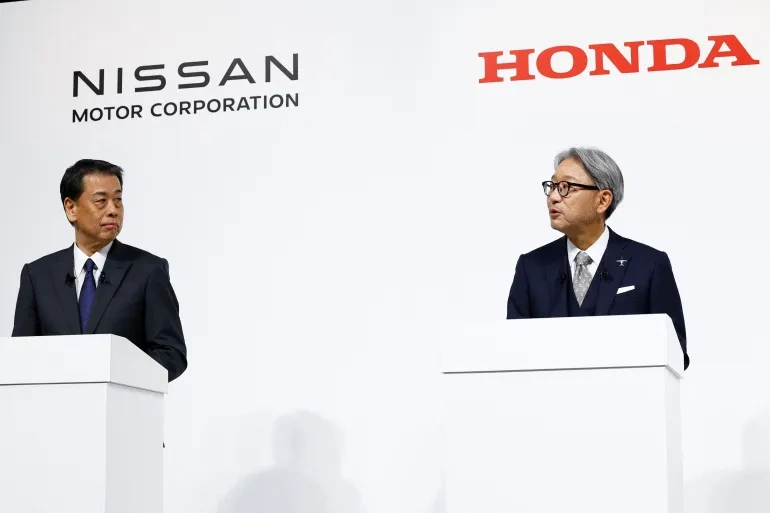 Nissan President Makoto Uchida and his counterpart at Honda, Toshihiro Mibe, hold a joint news conference on their merger plans.
Nissan President Makoto Uchida and his counterpart at Honda, Toshihiro Mibe, hold a joint news conference on their merger plans.
Beyond Japan, Volkswagen also stumbles in China as Germany’s auto giants struggle to compete in the EV race. The company planned to close plants in Germany, lay off tens of thousands of staff and downsize remaining plants in the country
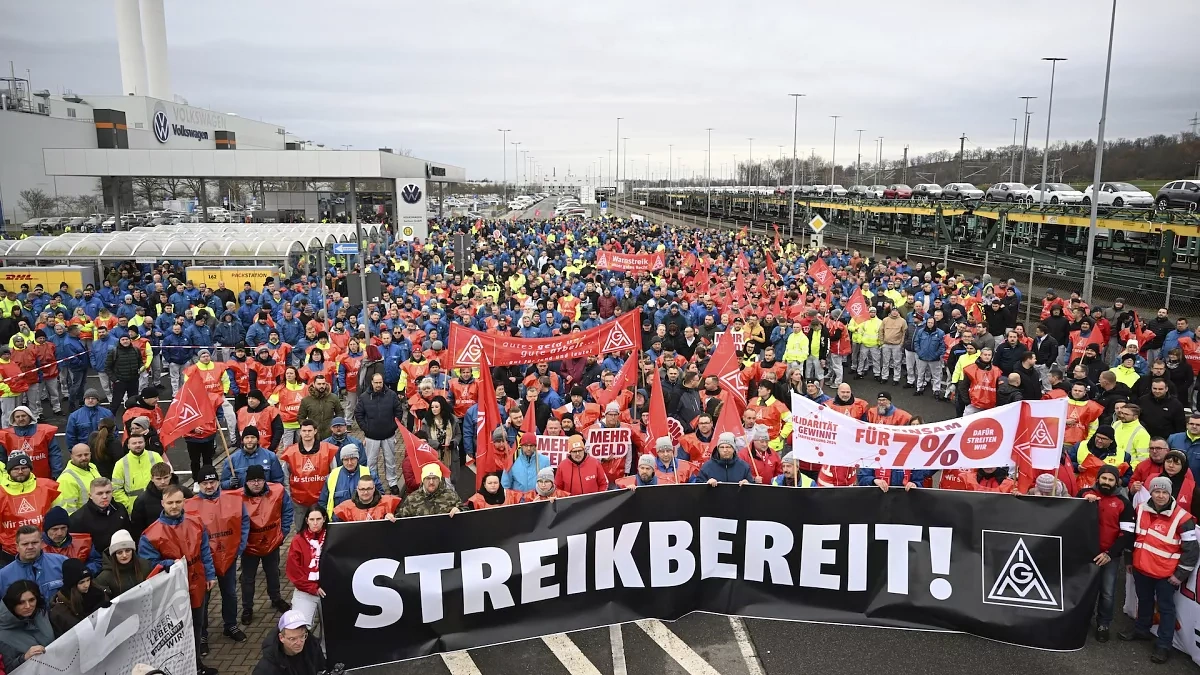 Volkswagen workers protested potential plant closures and pay cuts as the company struggles with declining market share in China
Volkswagen workers protested potential plant closures and pay cuts as the company struggles with declining market share in China
In the era of renewable energy and electrification, it’s clear that German and Japanese automakers are trailing behind. How is it that new Chinese players—companies barely established—are excelling in EV production, while century-old German and Japanese firms are struggling?
The traditional industry model in Japan and Germany relies on a system where a few large companies support an entire domestic supply chain. These large companies sell products globally, feeding the domestic supply chain, where many of the companies are small in scale—often referred to as “hidden champions.” Though relatively small, they hold significant market share and form the backbone of the country’s economy.
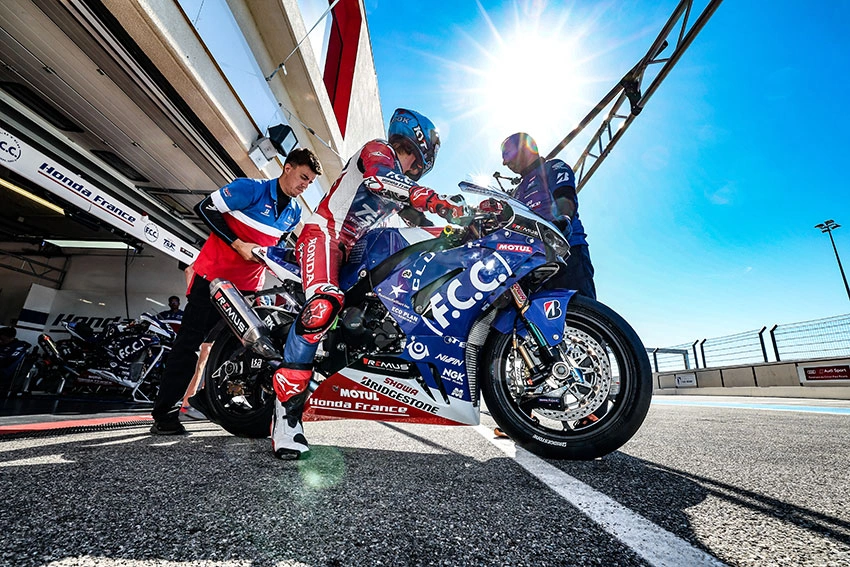 Japan’s premiere clutch manufacturer, FCC has steadily expanded its business alongside the development of the auto industry.
Japan’s premiere clutch manufacturer, FCC has steadily expanded its business alongside the development of the auto industry.
China’s EV players, on the other hand, rely on a fully integrated and developed domestic supply chain, something those large Japanese and German automakers lack. This creates a dilemma:
First, relying on China’s supply chain allows them to produce competitive products, but it would lead to the bankruptcy of their own small domestic suppliers, shaking the national economy and causing a sharp decline in GDP.
Second, not relying on China’s supply chain would also lead these small companies to the same outcome, as the large companies experience a decline in sales and can no longer provide enough financial support for them.
Now, Japanese and German automakers face a critical choice: ensure their own survival or protect the national economy. When forced to decide, they would probably choose the former. However, the government is unlikely to allow such a choice, which is why we see a series of trade protection policies from the EU.
When forced to make a decision, self-preservation is likely to take precedence. However, governments are unlikely to allow companies to make such a choice, which is why we see a series of trade protection measures from the European Union.
While technology is certainly important, China’s dominance in the EV market is not just due to technological advantages, but also its supply chain. This is not merely about scale or, as some argue, labor cost. Let me give you an example: As a German company, if you have a new technology, product, or feature in an emerging industry, wouldn’t you need to go through a cycle of validation, application, feedback, and improvement? Where would you validate it? Where would you apply it? The answer is clear: the largest current and future market—China. You can’t exactly validate it in a small German town with fewer than 100,000 people, can you? Even if you consider the entire EU market, it may be large, but it is mature and lacks the vitality needed to foster a emerging industry.

In fact, since the third industrial revolution, no major industrial wave has originated from Europe. This is because Europe’s dominant industries have all been built upon the achievements of the second industrial revolution. These century-old companies largely rely on the advantage they established in the 19th century, along with their technological monopolies. As a result, they have little interest in investing in emerging industries.
Moreover, from a broader trend perspective, there is a shifting dynamic between China and the EU markets, with former gradually surpassing the latter in scale. When you come to China, you quickly realize how rapidly the market is evolving. If your R&D team is based in a small town in Germany, they will struggle to keep up with these fast-paced changes. Naturally, you would move your team to a more dynamic and expansive market—China. Moreover, China has well-developed infrastructure, a stable policy and economic environment, and a highly efficient supply chain. So, why not move all production to China? Why stay in a small German town, relying on outdated market analysis, working in isolation, and incurring high R&D and production costs to produce expensive products, only to be easily outpaced by competitors in China?
Some might ask, why not move production to Vietnam or India? Here is catch: even if you produce in Vietnam or India, you would still rely on China’s supply chain. Meanwhile, both Vietnam and India struggle just to maintain a stable power supply, let alone develop a significant EV market. Even if production is set up there, most of the products will still end up being sold in China. So why bother? This is why China’s supply chain advantage is not just a matter of technology—it’s an inevitable historical trend. It can’t be curbed by a few technologies, labor cost points, or a certain percentage of tariffs. China’s advantage stems from its scale and size, as well as the hardworking, innovative, and resilient spirit of its people.
 In November, BYD became the first automaker to produce 10 million EVs.
In November, BYD became the first automaker to produce 10 million EVs.
Let me give you another example: Take high-speed rail. Over the past six decades, Japan has built only about 3,000 kilometers of high-speed rail. In contrast, China has constructed 46,000 kilometers in just over a decade, stretching from temperate to tropical regions, from plateaus and frozen soils to karst landscapes.
It is clear that which country has more experience and technology in construction. China’s high-speed rail system handles over 3 billion passengers annually, which is equivalent to 20 years of operations for Japan’s Shinkansen. So, it’s equally clear which country has gained more experience in operation and management. To put things into better perspective: If Japan were a European Country, it would have the largest economy, the largest population, and the second-largest land area in Europe.
In China, an emerging industry with around 5,000 companies competing fiercely for just one year may develop at a pace that would take an industry with only 50 companies in other countries two decades to reach. This is why, in the future, the only country that could challenge China is the United States. However, it would be the United States of the 20th century—the one that shaped the global industrial landscape—rather than the deindustrialized, protectionist, and isolationist version of the U.S. we see today.
The post Why Are Century-old German Automakers Failing at EVs? first appeared on China Academy.
]]>The post China is Saving EU’s Christmas from Red Sea Crisis first appeared on China Academy.
]]>
Over 2 billion people in more than 160 countries celebrate Christmas, and a small Chinese city called Yiwu, with a population of under 2 million, produces 80% of the world’s Christmas decorations, providing around $70 billion worth of goods globally each year.
That’s an amazing lever, isn’t it? However, this year, due to the Red Sea Crisis, Yiwu’s market share could rise to 100% in the EU.
Yiwu, located in Zhejiang, a coastal province near Shanghai, is the heart of Christmas decoration production. Typically, orders are placed in February or March, shipped by July, sold by wholesalers to retailers between August and October, and finally stocked on shelves before Christmas.
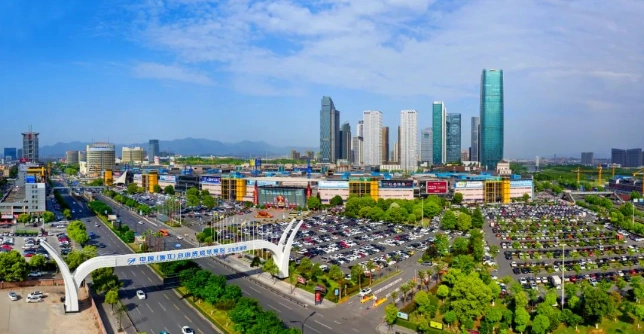 According to the World Bank,Yiwu International Trade City is the world’s largest small commodities market.
According to the World Bank,Yiwu International Trade City is the world’s largest small commodities market.
But this year, to avoid the conflicts in the Red Sea, many ships are now being rerouted around the Cape of Good Hope, with some even using Arctic routes. These detours add over 4,000 miles to shipping journeys. According to Reuters, average transit times have increased by about 50%, making it likely that Yiwu’s Christmas decorations will miss the holiday season.
Fortunately, Yiwu is one of the starting points for the China-Europe freight trains, a 13,000-kilometer railway network that delivers goods directly to Germany, France, and Spain in just 21 days. This rail line has become a crucial alternative to traditional shipping, with more European retailers turning to Chinese products. According to Yiwu Customs data released on December 19, the city’s trade volume reached over $70 billion in the first 11 months of 2024, a 17.6% year-on-year increase.
Most of the transportation needs of these new orders are met by rail. China Railway Group reports that between January and July, the China-Europe freight trains ran 11,403 trips, transporting 1.226 million TEUs, with year-on-year increases of 12% and 11%, respectively. While the railway company has raised 20% prices to manage demand, many Chinese businesses are still desiring to secure more space.
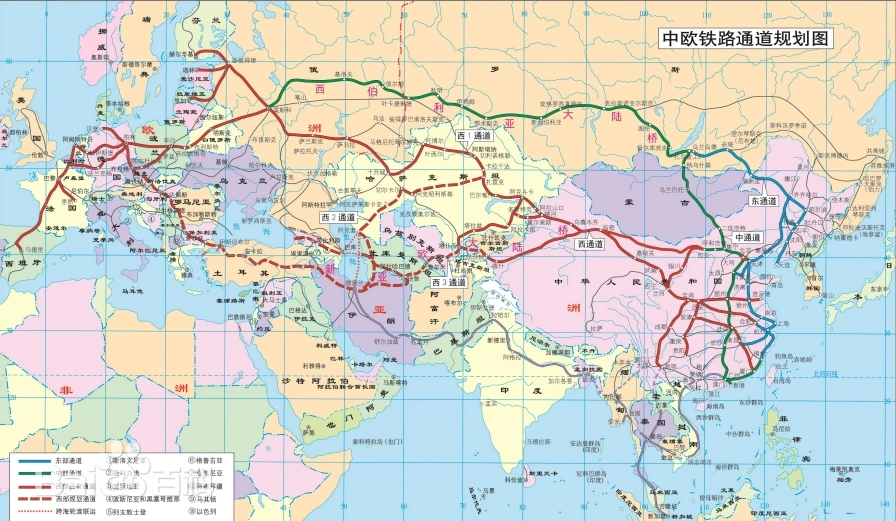
Ironically, just two years ago, Bloomberg called this rail project a waste of money, as it was twice as expensive as sea shipping. But now, safety and speed have proven priceless. By December 2024, the China-Europe freight trains have reached 227 cities in 25 European countries and more than 100 cities in 11 Asian countries, covering the entire Eurasian continent and ensuring that trade between Asia and Europe can continue regardless of disruptions in the shipping industry.
Meanwhile, U.S. retailers are nearing the edge. Despite Yiwu-made Christmas decorations being cheaper than domestic ones in the U.S., newly imposed tariffs against China have significantly increased costs for American retailers.
A December 21st Bloomberg report revealed that Party City, which sells costumes and party goods, filed for bankruptcy, planning to close approximately 700 stores. This could trigger a vicious cycle in the retail industry, as competitors are forced to offload inventory. If several retailers do this at once, it floods the market with discounted products, forcing others to lower their prices, ultimately weakening profits.
The situation is already unfolding. U.S. furniture retailer Conn’s was among the first to start dumping inventory after filing for bankruptcy in July. The trend accelerated in September with Big Lots, followed by Eastern Mountain Sports and Bob’s Stores the following month, all holding going-out-of-business sales.
No matter what, we hope everyone enjoys a perfect Christmas, and that every child, regardless of color or belief, can enjoy the decorations with reasonable prices, and the priceless gift of safety.
The post China is Saving EU’s Christmas from Red Sea Crisis first appeared on China Academy.
]]>The post China’s New High-Speed Train Is Turning Musk’s Failed Idea into Reality first appeared on China Academy.
]]> China’s 600 km/h high-speed maglev traffic system rolled off the line in 2021
China’s 600 km/h high-speed maglev traffic system rolled off the line in 2021
In 2013, Elon Musk proposed the idea of a pod that could whisk passengers from Los Angeles to San Francisco in just 35 minutes, describing it as “feeling a lot like being on an airplane.” Now, China is turning this vision into reality.
According to South China Morning Post on December 1, a research team from Southeast University found that simply laying two parallel cables inside the wall of the tube could provide 5G connectivity to China’s new generation of high-speed train—maglev hyperloop train.
The maglev hyperloop system, also known as the “high-speed flying train,” is designed to reach a top speed of 1,000 km/h, faster than most airplanes. The superconducting maglev technology levitates the train to eliminate friction as it travels through the specially designed low-vacuum tube. The near-vacuum conditions reduce air resistance, allowing the train to “fly” just above the ground at ultra-high speeds.
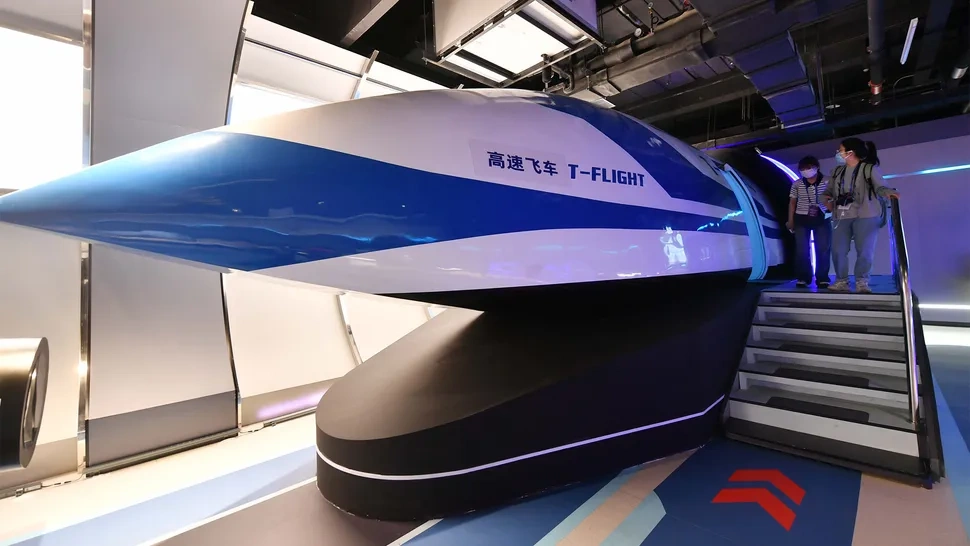 China’s maglev hyperloop train developed by the China Aerospace Science and Industry Corporation
China’s maglev hyperloop train developed by the China Aerospace Science and Industry Corporation
For years, many believed Elon Musk’s dream of hyperloop trains would be the first to break through. A former SpaceX subsidiary, the Boring Company, spun out as a separate business in 2018, did build a few short tunnels, including a mile-long prototype tube near SpaceX headquarters in Hawthorne, California. However, other proposed loops never materialized. In 2023, American startup Hyperloop One, which was highly touted by Musk and had secured over $450 million since its launch in 2014, quietly shut its doors.
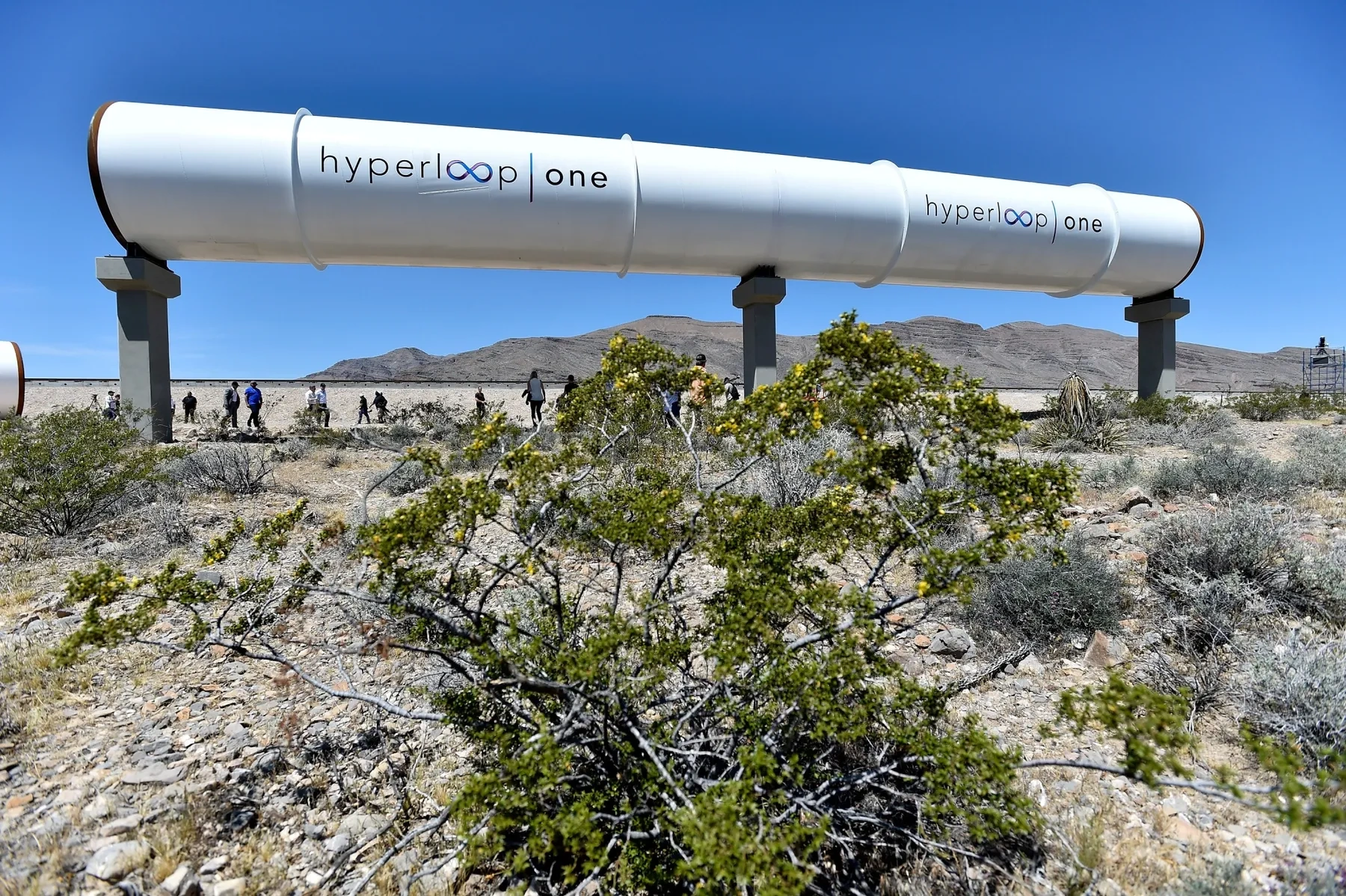 Hyperloop tubes tested by Hyperloop One
Hyperloop tubes tested by Hyperloop One
However, In August of this year, Chinese scientists successfully ran a train in a 2km low-vacuum tube. According to Science and Technology Daily, during the test, the train could navigate accurately, stay stable and stop safely. The system, developed by the China Aerospace Science and Industry Corporation (CASIC), integrates space technology with ground transportation. According to CASIC, the current test results have surpassed 622 km/h, while the world’s fastest operational train, China’s Shanghai Maglev, can only reach 460 km/h. Clearly, this sci-fi technology is no longer just a fantasy—China is making it happen.
Moreover, China’s high-speed flying train offers more than just shorter travel times. Traditionally, airplanes have been the preferred choice for long-distance travel. For example, traveling from Shanghai to Beijing by plane takes about 2 hours, while even the current fastest high-speed train takes about 4 and a half hours.
However, airplanes produce significantly more carbon emissions compared to trains. According to the International Energy Agency (IEA), the transport sector is the second-largest source of carbon emissions globally, with aviation emissions rising rapidly over the past two decades. In 2019, aviation alone contributed approximately 1 billion tons of carbon dioxide, accounting for nearly 2.8% of global emissions from fossil fuel combustion. Additionally, aviation emissions have been growing even faster than any other transport and have more than doubled between 1990 and 2019.
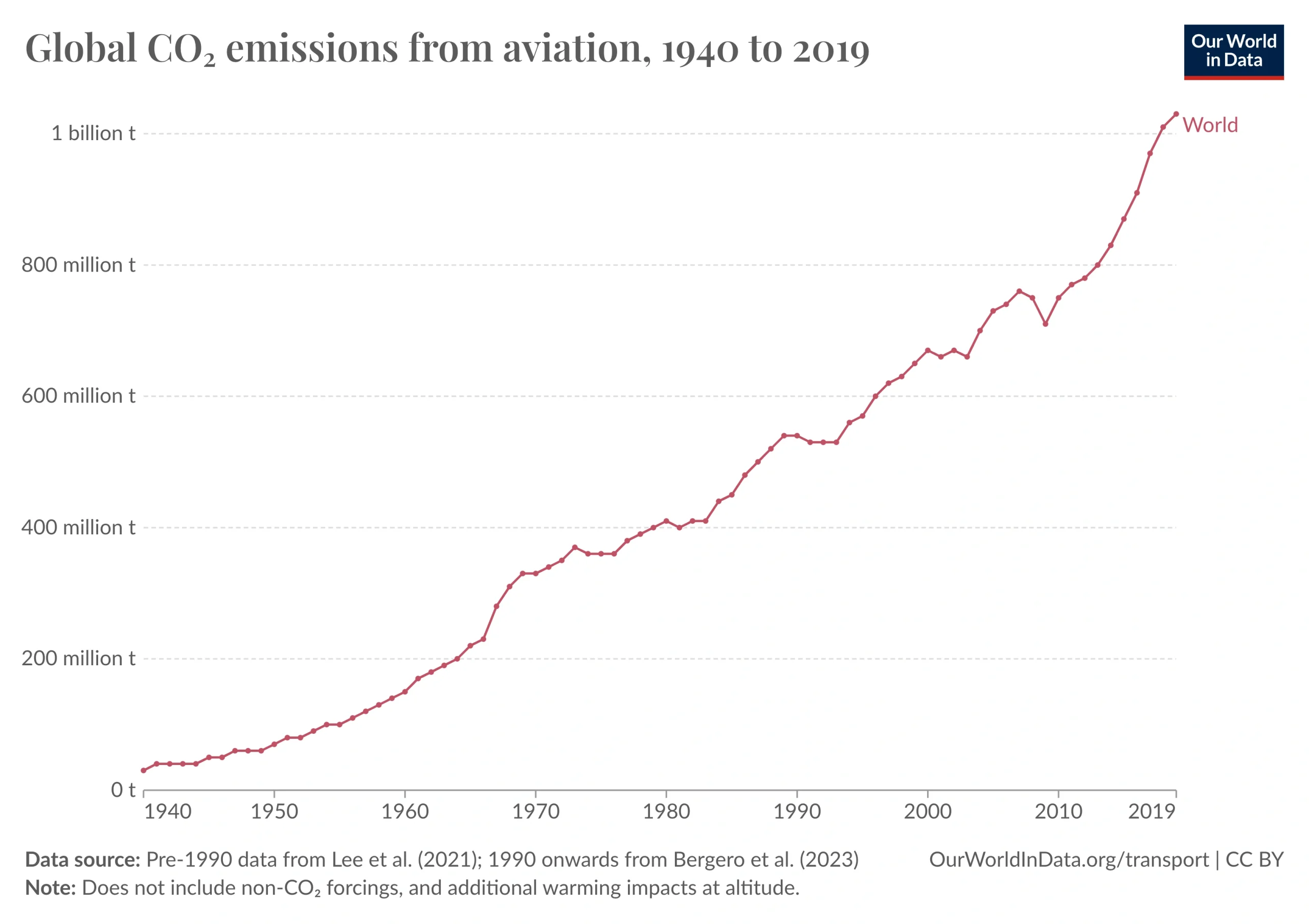 Global CO2 emissions from aviation have quadrupled since the 1960s
Global CO2 emissions from aviation have quadrupled since the 1960s
But now, China’s “flying train” offers a faster and more environmentally friendly alternative to airplanes. It could cut travel time between Beijing and Shanghai to just 90 minutes while significantly lowering carbon emissions and other pollutants, as it is fully powered by electricity. Currently, China’s high-speed rail network has already led to a substantial reduction in greenhouse gas emissions. A study published in the journal Nature Climate Change found that the high-speed railway has annually reduced over 11 million tonnes of carbon dioxide, equal to 1.3% of greenhouse gas emissions in China’s transport sector.
On the other hand, the design of this high-speed “flying train” also shows China’s efforts to protect ecosystems. In fact, road traffic and transportation development have posed a threat to the habitats and migration of wild animals. However, this has been a key consideration in the design and construction of China’s railway network. For example, on a section of the Shenzhen-Maoming Railway in Guangdong Province, China has built the world’s first fully enclosed noise barrier for high-speed trains. The barrier, which is over 1 mile long and costs nearly $25 million, was constructed to protect a local bird sanctuary housing more than 30,000 herons. According to Chinese official media, the barrier effectively reduces noise, vibration, and light when the high-speed trains pass through.
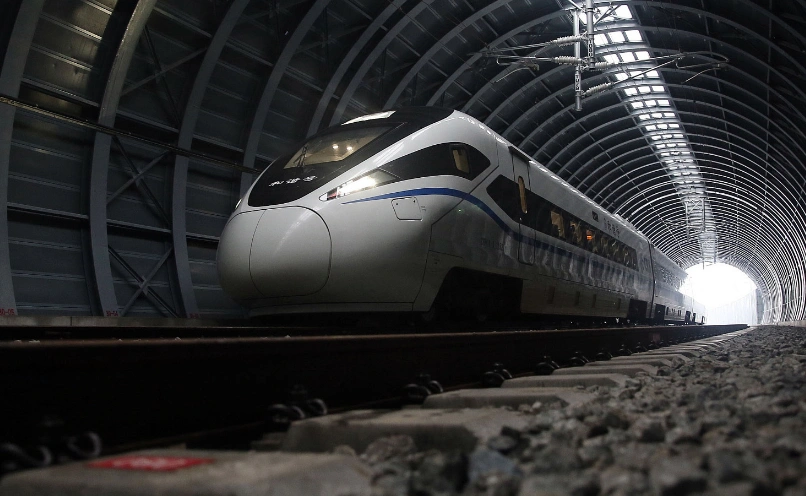 The arched steel structure, with sound insulation and concrete acoustic boards, is less than 1 mile from a local bird sanctuary
The arched steel structure, with sound insulation and concrete acoustic boards, is less than 1 mile from a local bird sanctuary
Now, the new high-speed train is designed to travel entirely inside a low-vacuum tube, allowing it to not only reach greater speeds but also significantly cut down on noise pollution and minimize its environmental impact along the route.
The post China’s New High-Speed Train Is Turning Musk’s Failed Idea into Reality first appeared on China Academy.
]]>The post Sweden Says Only 50% Chance to Save My Womb—China Promises 99% first appeared on China Academy.
]]> Anna Hammarström and her families
Anna Hammarström and her families
This year, Anna was pregnant with their 12th child. This pregnancy came from a frozen embryo that the couple preserved years ago. Originally stored in Ukraine, the embryo had to be rescued and relocated to Georgia due to the ongoing Russo-Ukrainian War before being implanted into Anna’s uterus.
Anna loves the feeling of being pregnant. Despite her age, the hormonal changes bring her energy and vitality. To mitigate the risks associated with her advanced maternal age, she follows a strict diet and takes daily walks with her dog, Bella.
The baby’s movements were strengthening as it grows. However, a routine ultrasound revealed that Anna’s placenta might be improperly positioned. Then, she is transferred to Lund University Hospital for further evaluation.
At Lund, specialists diagnosed Anna with a severe pregnancy complication: invasive placenta, or placenta accreta, a condition where the placenta grows into the uterine wall. This could lead to life-threatening hemorrhaging during delivery.
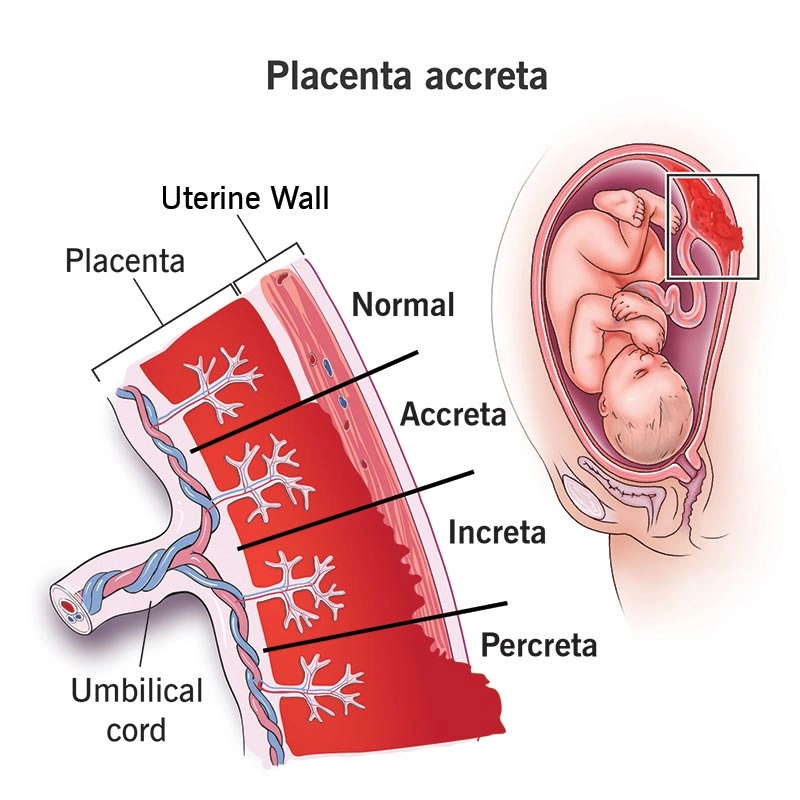
The condition is more commonly seen in women who have undergone previous C-sections. The placental villi can grow along uterine scars and invade the uterine muscle layer. Anna, who has triplets in her first pregnancy and twins in her second, has undergone three C-sections, significantly increasing her risk of developing this condition compared to the average pregnant woman. In Sweden, approximately 50 cases of invasive placenta are reported annually.
The Swedish specialists proposed a treatment plan to deliver Anna’s baby several weeks before the due date via C-section, combined with a hysterectomy. This approach is designed to prevent severe hemorrhaging during the detachment of the placenta and is considered the “gold standard” for managing invasive placenta in Europe and the United States.
However, Anna refused to accept this surgical plan. Despite being 58 and having implanted her last frozen embryo, she was determined to keep her womb. As a doctor, she understood that removing the uterus is a major operation with potential risks and long-term complications. “For me, it’s about how I perceive myself as a woman,” she explained. “Why should I remove a healthy organ? The same applies to any part of my body.” Doctors at Lund University Hospital warned that if she insisted on keeping her uterus, there was at most a 50% chance of preserving it—a probability Anna found unacceptably low.
Thanks to her profession, Anna was skilled at researching medical information online. After several days of relentless searching, she discovered a solution that promised a safe delivery while preserving her womb: traveling to China for a C-section.
Invasive placenta typically occurs in women who have undergone previous C-sections.
China is known for its historically high C-section rates but saw relatively few cases of women with prior C-sections having additional pregnancies due to the strict one-child policy. However, since the introduction of the two-child and three-child policies, this situation has changed significantly. Data suggests that the incidence of placenta accreta among Chinese women is 1 in 250, compared to the global average of 1 in 5,000—19 times higher. This has given Chinese doctors extensive experience in managing invasive placenta cases.
Without hesitation, Anna sent an email to Dr. Wang Hongmei at Shandong Provincial Hospital in northern China. In the email, she explained her situation and mentioned that she had come across Dr. Wang’s published research on surgical techniques for invasive placenta. Anna expressed her desire to travel to Shandong for a C-section under Dr. Wang’s care.
Dr. Wang replied within hours, confirming that Anna could undergo surgery there but cautioning against the long journey from Sweden, citing safety concerns.
However, this response did not deter Anna. Once she learned that surgery was possible, she immediately began applying for a visa and booking flights. At 35 weeks pregnant, she successfully flew to Jinan, Shandong Province, with her husband. When Dr. Wang Hongmei heard that her Swedish patient had visited museums and shopped for gifts for her children after arriving, she promptly called Anna to the hospital to arrange for her admission.
Anna was impressed by the efficiency of blood collection in China’s public hospitals. “Patients line up at the nurse’s station, and when it’s your turn, you just stick your arm out” she remarked.
After a series of tests, Dr. Wang assured her that she had a 99% chance of preserving her uterus, a significantly higher estimate than the 50% given by specialists at Lund University Hospital. Dr. Wang explained that between 2016 and 2018, during the early years of China’s two-child policy, she performed 2–3 invasive placenta surgeries every week, which made her confident in this surgery.
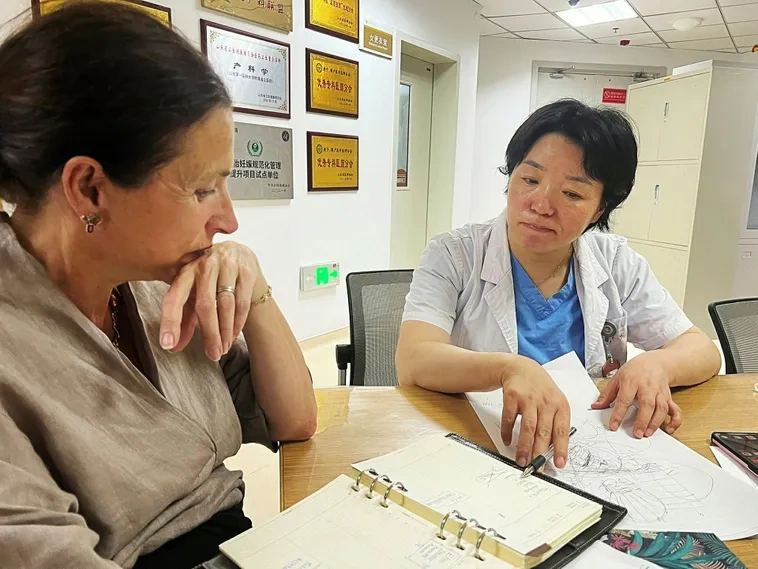 Dr.Wang and Anna
Dr.Wang and Anna
The C-section was performed under spinal anesthesia, allowing Anna to remain fully conscious throughout the procedure. The surgery lasted about an hour, with surgeons entering through an old C-section scar. The total blood loss was comparable to that of a standard C-section. After the surgery, Dr. Wang explained in simple English that although Anna’s placenta covered a large area, it had not deeply invaded the uterine wall.
Anna and her husband named their 12th child Rosa. Due to being born prematurely, Rosa was placed in the neonatal intensive care unit for a few days. After being discharged, the family stayed in China for another month, then returned to Sweden, carrying a variety of gifts from Dr. Wang.
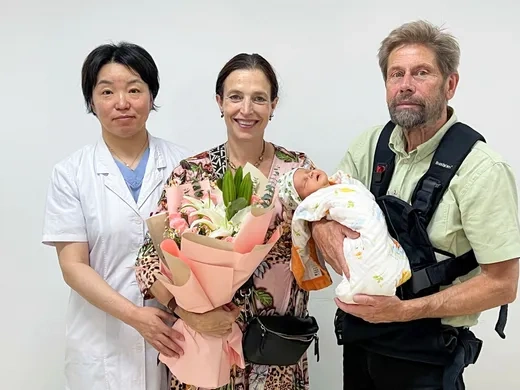
Once back in Sweden, Anna set a new goal: to invite Dr. Wang to Sweden, so she could share her surgical techniques with Swedish doctors.
A reporter asked Anna, “How do you view the risks of being pregnant at your age?”
Anna replied, “I’m not someone who particularly enjoys taking risks. I don’t go skydiving, I don’t speed while driving, and I don’t do extreme skiing. I’ve assessed my physical condition and believe I can handle the pregnancy. All the risks can be managed with proper monitoring.”
The reporter then asked, “But wasn’t traveling to China in the later stages of your pregnancy a risk?”
Anna responded, “I wasn’t worried. I have confidence in the medical care I could receive in China. Swedish doctors aren’t as experienced with dealing with this kind of complication.”
In fact, Anna is not the first Swede to travel a long way to China for medical care. Pernilla, a 33-year-old Swedish woman, suffers from spinal muscular atrophy (SMA). In 2017, a drug called Spinraza, which can effectively treat SMA, was approved for use. However, Swedish authorities determined that the cost-effectiveness of providing the drug to adults was too low. As a result, Sweden only offers the treatment to SMA patients under 18. At the time, there were 72 SMA patients across Sweden who did not have access to the new drug, and Pernilla was among them. Eventually, Pernilla discovered that the drug was priced at just one-seventh of its cost in Sweden on the Chinese market. As a result, she now travels to China every quarter to obtain the medication.
Alma, a 2-year-old Swedish girl, was diagnosed in May of this year with a fatal metabolic disorder called MLD. The cost of a single dose of the medication to treat MLD in Sweden is over $2 million, and Swedish hospitals refused to administer the drug to Alma. Subsequently, Alma’s parents discovered that Chinese doctors were able to treat this condition, with treatment costs being ten times lower than in Sweden.
In Sweden, one of the wealthiest countries in the world, people are traveling to the other side of the globe to seek medical treatment. Meanwhile, China has not turned these international patients away, offering them the same affordable and efficient care as it provides to its own citizens.
The post Sweden Says Only 50% Chance to Save My Womb—China Promises 99% first appeared on China Academy.
]]>The post Northvolt Bankruptcy: How Europe’s Battery Ambition Failed Against China? first appeared on China Academy.
]]>The post Northvolt Bankruptcy: How Europe’s Battery Ambition Failed Against China? first appeared on China Academy.
]]>